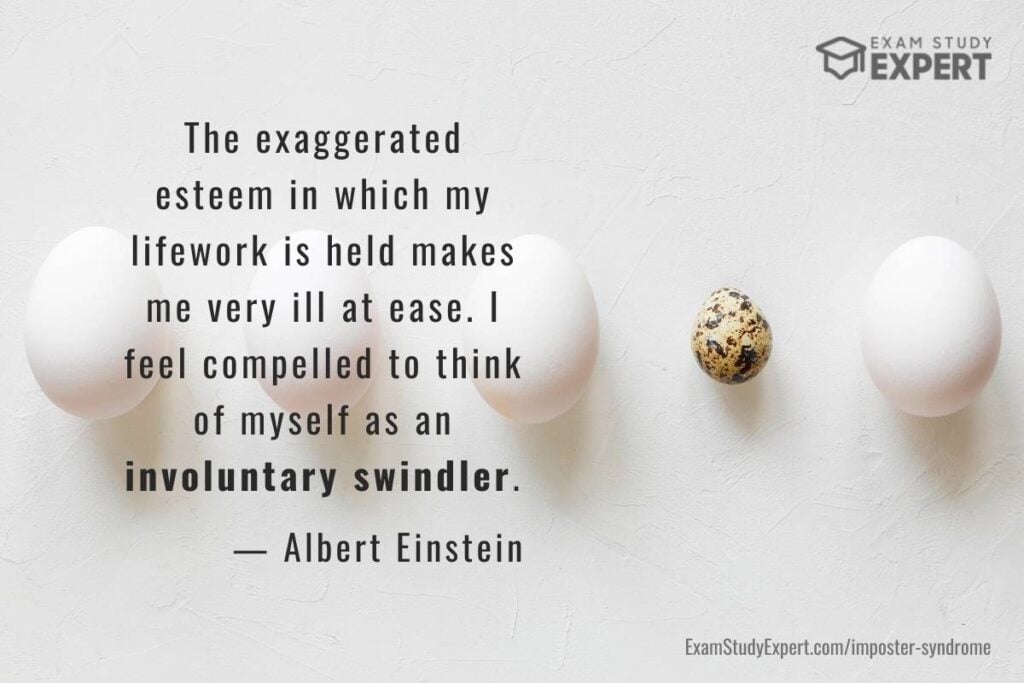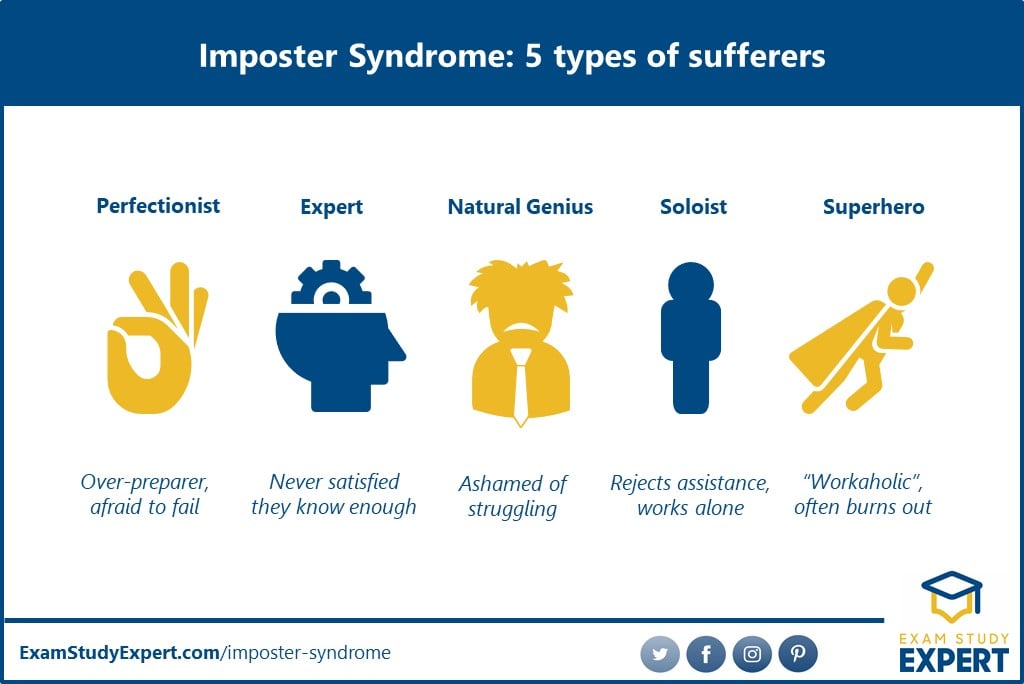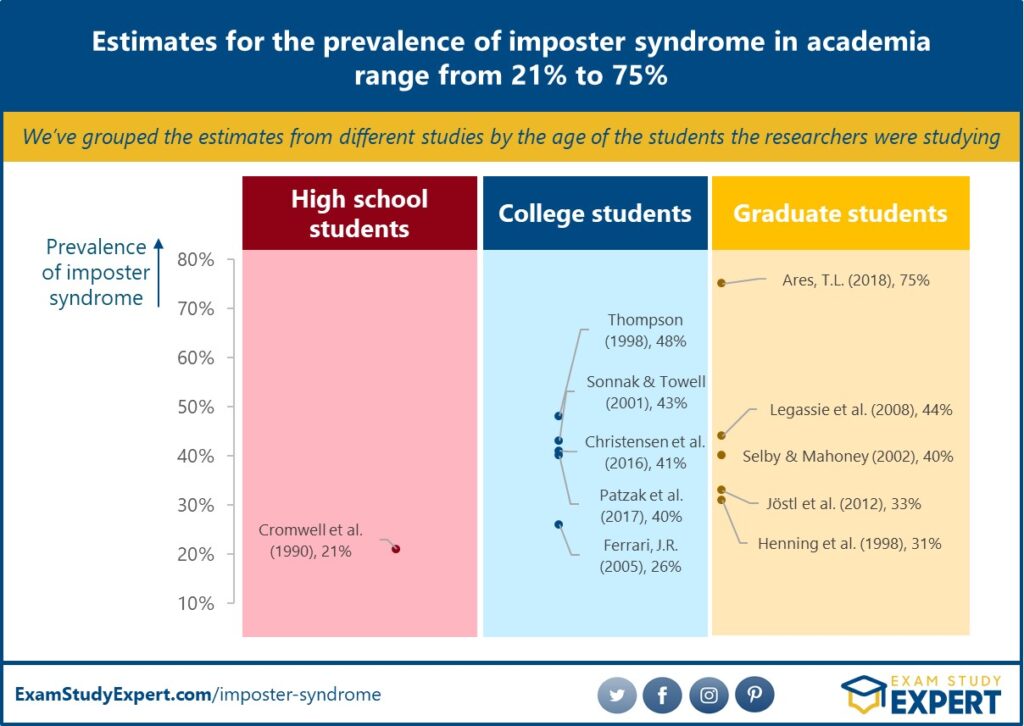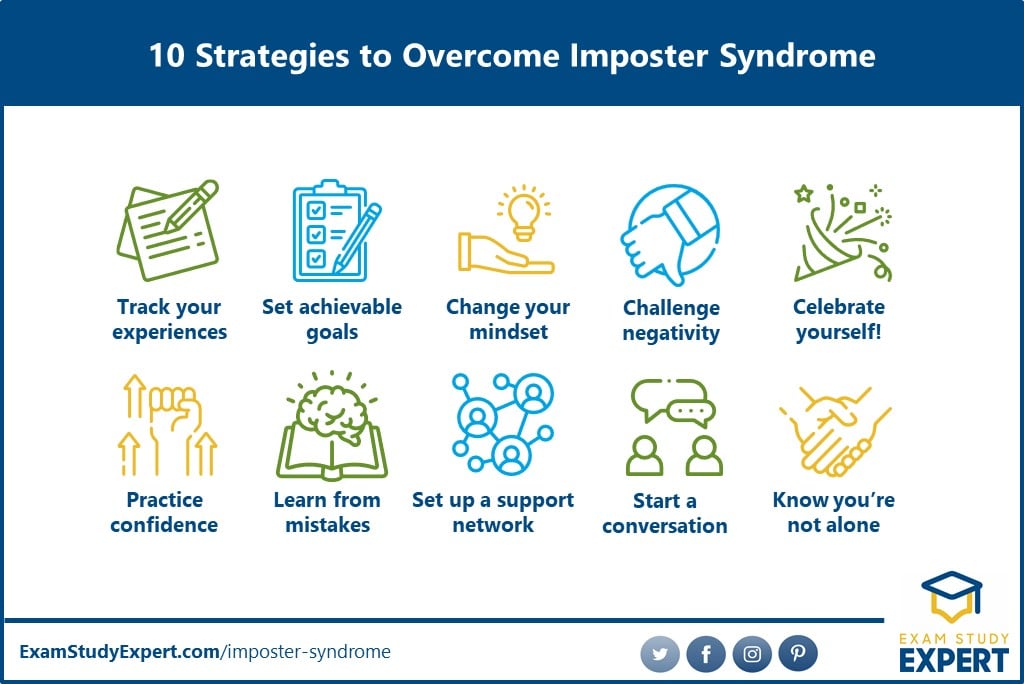Have you ever felt that you really don’t deserve to be where you are – at university, or doing your job? That you only got where you are by accident? And that someday soon, someone will realise you’re just an imposter?
Sounds like you’re suffering from “imposter syndrome”.
I’m going to start with two important facts, that I hope will reassure you: you’re not alone, and you CAN overcome imposter syndrome.
Keep reading to:
- Learn about what imposter syndrome is and how you can recognise it
- Find out some shocking imposter syndrome statistics
- Discover 10 strategies and 22 helpful activities to help you overcome imposter syndrome
- What is imposter syndrome?
- You’re not alone: imposter syndrome statistics and stories
- Imposter syndrome in academia
- Is there a silver lining to imposter syndrome?
- How to overcome imposter syndrome: 10 strategies and 22 helpful activities
- Useful resources for overcoming imposter syndrome
- Imposter syndrome: the takeaways
- The Science Of Studying Smart
What is imposter syndrome?
The term “imposter phenomenon” was first coined in 1978 by two psychologists, Dr Pauline Clance and Dr Suzanna Imes. Their work began as a study of the feeling of “intellectual phoniness” amongst high-achieving, highly accomplished women.
But imposter syndrome has been around for a long time – long before it had a name. Renowned physicist Albert Einstein himself famously once said:
“The exaggerated esteem in which my lifework is held makes me very ill at ease. I feel compelled to think of myself as an involuntary swindler.”

At its core, “imposter syndrome” is a collective term for feelings of inadequacy and unworthiness, and fear of being found out. Imposter syndrome is a “self-fulfilling pattern of thought”, a vicious circle that needs to be broken.
Imposter syndrome sabotages your rational brain and your ability to perceive your own achievements. It plays on your doubts and fears, your sense of self-worth, and is characterised by feelings that persist despite evidence of your successes. Therefore, sufferers cannot internalise the fact that they have earned their achievements.
The problem with imposter syndrome is that success does nothing to change your self-beliefs – in fact, the more you accomplish, the more you feel like a fraud.
Imposter syndrome is predominant amongst high achievers (in any field!), who are unable to accept their successes. Whilst it’s most commonly found in the workplace and in academia, imposter syndrome can affect any part of life.
Whilst that all sounds a little melancholy, don’t panic yet! Over the last few decades, increasing research and public interest in imposter syndrome has created solid base of information and resources.
And we’re going to explore the best of it to help you examine your own imposter feelings and how to overcome them:
Imposter syndrome: the symptoms
The first step in overcoming imposter syndrome is the ability to recognise it in yourself. It can be scary to confront a long list of symptoms and recognise your own experiences, but in the long term this ability is so important.
And you won’t be alone: as someone who has travelled this path, I’m here to guide you 😊
The bad news is that imposter syndrome can manifest in many ways.
So think of this as your “have I ever felt like this” checklist. If you tick the boxes, the 10 helpful strategies below are your “what next” masterclass in overcoming these feelings.
Do you:
- Have regular nagging feelings of self-doubt and unworthiness?
- You feel that that you don’t deserve to be where you are
- Perhaps you fear that your peers and colleagues will find out
- You feel like you don’t belong, that you don’t fit in at your workplace or amongst your peers
- Sabotage your own success?
- You set excessively challenging goals, and feel disappointed when you don’t achieve them
- You’re sensitive to (even constructive) criticism and sceptical of praise
- Maybe you agonise over the smallest mistakes in your work
- You downplay your own expertise, even in areas where you are genuinely skilled
- Expect yourself to be an overachiever?
- You constantly need to prove yourself
- You fear that you won’t live up to expectations
- Feel unable to realistically assess your own skills and competence?
- You attribute your success to luck, timing or other external factors
- Perhaps you regularly criticize yourself and your performance
- You ignore or discount evidence of your achievements
- Feel afraid of asking for help?
- You think asking for help is a sign of weakness that demonstrates your unworthiness

Unfortunately, although imposter syndrome is not considered a mental health condition, it can interplay with many mental health illnesses. It can result in, or exacerbate anxiety, depression, perfectionism, superstitious beliefs and other issues.
So if you recognise any of these feelings in yourself, and you’re worried about your mental health, please speak to a professional such as your doctor, or a mental health organisation such as Mind.
Imposter syndrome triggers
If you find yourself identifying with any of these feelings, you might be wondering why. Imposter syndrome research has identified several common factors that increase your risk of triggering imposter feelings:
- Experiencing discrimination
- This is often an important factor for marginalised populations and women in academia and the workplace, as several studies have examined
- New challenges, such as a promotion or increased responsibilities at work
- Family environments which emphasise high achievements, or in which you feel compared to gifted siblings
Try asking yourself: What is triggering my imposter syndrome (today)? In what situations do I feel this way – at university, in the office, at home?
The five types of imposter syndrome sufferers
Have you ever wondered what kind of people are most likely to suffer from imposter syndrome?
In her book The Secret Thoughts of Successful Women,* imposter syndrome expert Dr Valerie Young suggests that there are five types of imposter syndrome sufferers, people whose personality traits lead them to doubt their self-worth and constantly strive to prove it.

1. The Perfectionist
A perfectionist is never satisfied, fixates on mistakes, and is always convinced their work should be better. They suffer from high levels of doubt and anxiety from the pressure they put on themselves and unachievable goals they set.
2. The Expert
An expert is a highly skilled person who undervalues their own expertise and is never satisfied with their level of understanding. Therefore, they often spend far too much time researching and aiming to learn more, making it hard for them to finish projects or trust in the quality of their own work.
3. The Natural Genius
A natural genius is someone who has always mastered new skills quickly, and therefore feels ashamed and unworthy when faced with a goal that is too hard for them. They often set lofty goals for themselves in the expectation of success and feel crushed when they don’t achieve them immediately. They usually struggle to ask for help.
4. The Soloist
A soloist prefers is very individualistic and prefers to work alone as their self-worth stems from their productivity. They often reject assistance as they see asking for help as a sign of weakness or incompetence, and often seek to prove themselves through their work.
5. The Superhero
A superhero is a “workaholic” who feels compelled to work as hard as possible, often excels due to this extreme effort and yet fears being found inadequate. They are therefore susceptible to burnout, affecting both their mental and physical well-being over time.
As you may have noticed, the five types have many overlapping traits, underpinned by differing motives. You may recognise in yourself the drive to produce ever-better work, struggle to ask for help, or feel your self-worth stems from your productivity.
If you do, and you want to overcome these feelings, head on down to our top 10 strategies for overcoming imposter syndrome!
In the meantime, we’re going to explore some statistics about the prevalence of imposter syndrome to remind you of that important fact:
You’re not alone: imposter syndrome statistics and stories
Since Clance and Imes coined the term “imposter phenomenon” there have been increasing numbers of studies into the phenomenon, within academia and outside of it.
These studies have varied significantly in their aims, focus groups and methodologies. So there is no one statistic about the prevalence of imposter syndrome.
But one thing we do know is that it is common across many communities: women, men, minority groups, university students, schoolchildren, adults in the workplace … and more.
We’ve collected a range of statistics from recent studies that explore imposter syndrome …
… in academia

Symptoms of imposter syndrome have been experienced by:
- 21% of high school students (Cromwell, 1990)
- 26% to 48% of college students (Thompson, 1998), (Sonnak & Towell, 2001), (Ferrari, 2005), (Christensen et al., 2016), (Patzak et al., 2017)
- 31% to 75% of graduate students (Henning et al., 1998), (Selby & Mahoney, 2002), (Legassie et al., 2008), (Jöstl et al. 2012), (Ares, 2018)
To learn more about these studies, this systematic review article is a great place to start.
… in the workplace
A recent study of 3,000 adults in the workplace (OnePoll, Access Commercial Finance, 2018) concluded that:
- 62% experienced imposter syndrome at work
- 86% of younger people (aged 18-34) were highly affected by imposter syndrome
… amongst women
Following Clance and Imes’s lead, many studies have focused on high-achieving women in the workplace. Results from two recent studies continue to suggest that imposter syndrome is prevalent amongst women:
- 66% of women experienced imposter syndrome at work, compared with 56% of men (OnePoll, Access Commercial Finance, 2018)
- 15% to 90% of 1,000 women surveyed experienced symptoms of imposter syndrome (The Hub Events, 2019), including:
- Feeling underserving of their current success: 73%
- Experiencing intrusive thoughts: 51%
- Believing their success is a result of luck or chance: 37%
- Believing they will be found out: 24%
Other research has explored the cultural biases that influence the susceptibility of minorities (see also this article), genders, medical professionals (see also this article and this article), and different socioeconomic groups.
Here’s the takeaway:
We now know that anyone can suffer from imposter syndrome.
It can strike at any stage of your life or (academic) career. It doesn’t discriminate between gender, race or discipline.
And no-one should be ashamed of suffering through it.
As Elizabeth Cox explains in this TedEd video on the subject, what makes imposter syndrome so common is that we all suffer it privately, believing that we alone feel this way because no-one shares their fears. She calls this shared experience “pluralistic ignorance”.
The celebrity voice
In recent years, a large number of famous figures have spoken about their own experiences of imposter syndrome.
Given society’s desire to put celebrities and their achievements on a pedestal, being reminded of theie hard work and struggles can be really helpful in reminding imposter syndrome sufferers that they’re not alone. Imposter syndrome can affect anyone – even your idols!
You might be surprised by the names that pop up:
- physicist Albert Einstein
- First Lady Michella Obama
- tennis star Serena Williams
- Nobel Laureate Maya Angelou
- Supreme Court Justice Sonia Sotomayor
- actors Emma Watson, Daniel Radcliffe, Meryl Streep, Tom Hanks, Renée Zellweger and Kate Winslet
- presenter Holly Willoughby
- popstars David Bowie and Lady Gaga
You can read about their experiences in this collection of quotes (or this article), or why not give their stories a Google?
Perhaps you’ve noticed that these voices come from fields that prize very personal skills: musicians, artists, writers, actors, athletes. There’s no hiding in these pursuits: you’re presenting yourself to the world, and unfortunately, that can be a fertile ground for imposter syndrome!
My journey with imposter syndrome
This is perhaps the hardest article I’ve ever written for Exam Study Expert because it forced me to confront my own journey with imposter syndrome (and if I’m perfectly honest I initially had a little imposter syndrome about writing about imposter syndrome!).
I struggled with imposter syndrome during my PhD. I found myself in an unfortunate situation where my supervisor and I had a serious conflict in work styles. In the face of his “there’s no reason why you should have a problem” attitude, unable to explain why I was struggling (or why that struggle was valid), my belief in my ability to write (quite a crucial skill for a PhD student!) and my mental health crumpled mid-PhD. One very long year later, I was very lucky to be paired with a new supervisor whose support and encouragement gave me the courage to believe in myself again and to successfully complete my PhD thesis and graduate. I will forever be grateful to her.
And now when I find that little imposter demon waking up on my shoulder I can walk over to my shelf, pick up that 100,000-word thesis I wrote, and remember how proud of my achievements I am. I can say “not today thanks!”.
It took me a long time to recognise my feelings for what they were, and to find the courage to ask for help. It took me even longer to research imposter syndrome and appreciate the statistics.
So I hope that this article will give you the support, encouragement and resources to overcome your imposter syndrome that I finally found – and hopefully without such a long journey to get there!
Imposter syndrome in academia
It’s an accepted notion that imposter syndrome has a powerful presence in academia. It can be found even in (or perhaps especially in) selective, prestigious positions such as elite universities or sought-after graduate programmes and doctorates.

When I arrived at Cambridge University as an uncertain undergrad, imposter syndrome was all around. We were even explicitly told by our tutors that they had not made a mistake: we were all 100% supposed to be there.
And it doesn’t just affect the students. Teachers, lecturers and distinguished professors can also struggle with imposter syndrome, as we explore in this Exam Study Expert podcast episode with Dr Mark De Rond.
But why? Why do students and academics feel like imposters?
Well, firstly, the transition from being top-of-your-class at school to just one amongst many equally talented students is a difficult transition for many students. In fact, plenty of new university students (myself included) suddenly find themselves struggling and floundering as they adapt to the new learning environment and expectations.
Secondly, the traditionalism of academic environments can be unhelpful for many students and academics, breeding race and gender-based vulnerability, filled with the pressure to achieve,and with elitism, competitiveness and social hierarchies. Higher academia is also highly competitive for academics trying to win grants, publish papers and gain accolades in their journey to the top of their chosen field.
Some studies have even argued that academia cultivates imposter syndrome, and that female or minority-group academics have been “made to feel like imposters by the demographics or history of their field”.
Thirdly, education and academia (like music, art, writing) are very personal pursuits: a display of your knowledge, your research.
But it’s not just university students and academics who suffer from imposter syndrome. Many of the studies explored in this review article explore imposter feelings in students of all ages: even schoolchildren.
Happily, more and more academics and students are opening up about their experiences. You may find some reassurance and advice borne from personal experiences of imposter syndrome in their stories. Try these collections of quotes from professors and grad students, or have a listen to the Exam Study Expert podcast episode above!
Is there a silver lining to imposter syndrome?
Whilst for many people, imposter syndrome is a negative experience filled with self-doubt, there may be a silver lining for others in the form of increased skills and motivation …
A recent MIT study of workplace imposter syndrome, by Basima Tewfik, has concluded that employees struggling with self-doubt often excel in intrapersonal settings and are often recognised for their teamwork and cooperation.
The paper argues that whilst compensating for their perceived imposter-related failings, these workers develop strong social skills that were highly valued by their management and patients!
Encouragingly, Tewfik also found that people can shed their imposter concerns as they become more established in their roles in the workplace.
Similarly, for some people, like Dr Mark De Rond in the Exam Study Expert podcast episode above, imposter syndrome can fuel your motivation to achieve and improve your work. De Rond chooses to see his insecurity as a force for good, driving him to achieve more. However (as a word of warning), this drive can come at a high cost to your mental health and create a vicious cycle that reinforces the symptoms as valid.
How to overcome imposter syndrome: 10 strategies and 22 helpful activities
So here we are at the core of this article: ten actionable strategies to overcome your imposter syndrome! These are things you can try today to get the ball rolling – and form a great set of coping strategies for every time you sense those imposter feelings rising up!
If you’ve made it this far, hopefully you recognise that it is possible to live without the anxiety and fear of imposter syndrome!

To put it simply, to break the imposter syndrome pattern, you need to:
- Recognise it
- Take responsibility for your successes and accept that mistakes are a part of life
- Talk to others
- Embrace a growth-based mindset and focus on the opportunity to learn and develop
- Become comfortable with who you are
Are you ready?
1. Recognise how you’re feeling
The best place to start to overcome your imposter syndrome is by recognising the symptoms and signs and acknowledging how you are feeling. Don’t fight them – accept them so you can unravel them!
If you’ve made it to this section, you’ve probably already achieved this much with the checklist above – so congratulations!
If you struggle with imposter syndrome regularly, you’ll need to develop a quick-response coping strategy that suits you. Here are three examples:
- A great strategy is to keep track of your imposter feelings:
- Keep specific notes (write them down!) on when and why you encounter them. Chances are that once you’ve written about them the feelings won’t be so powerful.
- Counter any feelings of inadequacy with reality-based statements and affirmations.
- It might seem hard, and you might feel silly but practice it! Try this one: “I am qualified for this project because I …”
- Distance yourself from the situational imposter feelings by thinking about yourself in the third person to gain some external perspective.
And remember, your feelings are not the truth.
2. Work towards changing your mindset
An important part of overcoming your imposter feelings is working on your mindset. The aim here is to shake off the unsustainable ideas you believe to be true and replace them with realistic ones.
You may need to ask yourself some hard questions, like “What are my core beliefs about myself, my skills and my worthiness?”
Then consider what you believe about other people: your friends, peers and mentors. Do you think they are perfect? Probably not, right? So why should you be?
The best mindset to develop for your academic and working life is a growth mindset. You can learn all about growth mindset and its benefits in our helpful guide on how to develop one!
Here are three strategies for challenging your mindset:
- Make a realistic assessment of your abilities. If that seems impossible, ask a friend to help you – their perspective could be illuminating!
- Write it all down on a sheet of paper – I bet the positives are longer than you expected!
Be honest with yourself and you won’t spend so much time worrying that you’re not qualified anymore!
- Accept that perfectionism is impossible and unsustainable. Overcome it by focusing on setting achievable goals every day that are challenging but realistic.
- Explore our handy guide to learn more about effective goal setting.
- Start with baby steps: pick a task and complete it reasonably well – don’t focus on doing it perfectly! Then reward yourself for taking action and completing it!
- Comparing yourself to others can be dangerous for your mental health. Their successes are NOT your failures! With a growth mindset you can come to see the successes of others as great inspiration.
- It could be helpful to limit your social media use whilst you recover from your imposter feelings.
3. Challenge your negative thought patterns
Challenging the negative thought patterns that stem from imposter syndrome can be a difficult and relentless task. A great support network can help keep you grounded in reality (see #7 below!).
Try these two complementary tasks to combat the negativity:
- If you find yourself spiralling into self-doubt, take a moment and write down (by hand!) three things you’ve done well – today, this year, or ever (whichever you can manage)!
- Question your thoughts. Are they rational or factually true?
- Write down (by hand!) three reasons why your negative thoughts are meaningless or false. Take the time to explain to yourself why you’re worthy.
Sometimes, the best way to combat negative thoughts is with a happy dose of positivity and celebration:
4. Accentuate the positive
The best way to fight imposter syndrome is by proving that it’s wrong.
You need to celebrate YOU. Take responsibility for your success. Recognise your expertise and contributions. You earned it. You deserve it.
Sounds simple right?
Well, experience says otherwise, BUT in those moments when the doubt takes charge, choose a strategy that will remind you of what you do well and that others believe in you too!
You need to take responsibility for your success – don’t attribute it to luck, external factors, or help from others. It sounds cheesy but: own it, and go ahead and bask in it!

Try these three strategies:
- Collect the undeniable, physical evidence of your success – achievements, positive feedback, compliments, past successes. Collecting and revisiting is a powerful way to combat the irrationality of imposter syndrome!
- Make a record (print them out if you need to, and compile a folder!) and return to it regularly.
- Learn to accept compliments and truly appreciate what is being said the next time someone sings your praises.
- It might go against your instincts, but: take a moment listen, absorb, appreciate and reflect on the meaning of their words, because that person believes you deserve them!
- Celebrate and reward yourself to reinforce achievements with happy memories.
- Got an A on your paper? Got a lovely compliment from your teacher? Why not celebrate with a tasty dinner with family or friends!
5. Develop a healthy response to mistakes and failures
The flip side of all this positivity and appreciation for your achievements is the need to build up a healthy response to mistakes and failures.
Because we ALL make them. It’s part of life.
And accepting that perfectionism is impossible and hurtful – that you will make mistakes – is necessary!
The best way to do this? Develop a growth mindset.
Try these two strategies:
- Accept mistakes and honest failures as something to learn from – not something to be ashamed of.
- Writing out the sequence of events that led you here can be a great way to work out specifically what went wrong, and how it can be fixed – and alleviate any overwhelming guilt.
- The same goes for criticism, especially constructive criticism! What can you learn from it?
- Write down three things you can improve upon, or remember to do next time. And then move on – don’t beat yourself up about it!
6. Practice a confident attitude
You might have heard of the old cliché “fake it ‘til you make it”.
Well – this strategy builds on that concept. It’s called the “yet” game. You’re not confident – yet. But you can be!
I want you to behave like you’re confident in yourself, to build that very confidence.
Try these three strategies:
- Visualise the success you want – you can prepare yourself for the moment by getting into the right mindset for success. This works great for presentations and interviews.
- Remind yourself of what your goals are, why you set them and how you’re going to get there.
- This strategy can help you to enjoy and take responsibility for your success when it arrives!
- Try saying yes to something you’re usually afraid of failing at:
- Raise your hand, volunteer, take a calculated risk, do the presentation, put yourself out there!
- Taking that first step, without waiting until everything is perfect or you’re overprepared – is usually the hardest thing, but half the battle
- Change the way you see yourself to boost your self-belief:
- Make lists of things that qualify you for the job. If you find that hard, try doing it in the third person and imagine that you’re a colleague!
7. Build yourself a support network
Opening up and talking about your imposter syndrome experiences is a daunting idea. I get it.
A strong healthy support network can give you the confidence you need to take that step. Let them show you that your fears are unfounded.
You’ve probably already got one, even if don’t know it!
Your peers, colleagues, mentors, family and friends – turning to the people you trust and respect can be an amazing resource for combating imposter syndrome. Because these are the people with well-founded opinions about you, and your achievements and qualifications.
And don’t hesitate because you think their feedback will confirm your insecurities. You might even be pleasantly surprised about how many of them can relate to the way that you’re feeling (honestly!).

If you’re looking for professional support, why not try one of these three strategies?
- Speak to a mental health professional for help overcoming the symptoms of imposter syndrome and their effects on your life.
- Individual and group therapy, or Cognitive Behavioural Therapy, can be wonderful tools for addressing and combating the negative thought patterns associated with imposter syndrome in a supportive environment.
- Develop positive relationships with your peers and colleagues. Do you trust their professional opinions? Of you?
- If you have the ability to judge and celebrate their work on merit alone, leaving aside race and gender – then you should be able to view your own achievements in the same light! Think about yourself as a colleague would think about you.
- Drs. Clance and Imes recommend that you imagine telling the people you think you’ve tricked that you’re an imposter. How would they respond?
- Take some respite in the idea that they’d probably be annoyed that you doubted their professional judgement of your qualifications.
Now go and start that conversation for real 😊
8. Realise you’re not alone
I’ve mentioned this a few times now because it’s true. You’re just one of the many people who have experienced imposter syndrome. The statistics above show that many other successful people feel this way.
If you’ve spoken to your peers or mentors about your feelings, you might already be experiencing the clarity and relief of knowing you’re not the only one who has experienced this.
If not, try one of this activity:
- Read through some of the quotes and testimonies from celebrities, professors and students linked above – see for yourself!
You don’t need to suffer in silence. Why not share your story with us in the comment section below and help others to recognise this too?
9. Ask for help when you need it
You might feel that the need to ask for assistance only proves your imposter feelings. But that’s not true, trust me!
Asking for help was the single greatest thing I did to overcome my own imposter syndrome. Gaining that support was invaluable for me in re-building my self-confidence and completing my PhD.
Asking for help is not a sign of incompetence but strength. Remember that you’re only facing a temporary block and that you can overcome it.
Work your way up to asking for help with this strategy:
- Accept that you don’t need to have all the answers. No-one ever does, even your most distinguished professor!
- You might feel silly, but repeat to yourself: “I don’t need to have all the answers”. Then head on out and ask a mentor, colleague or mental health professional for help!
We need to build up awareness around the challenges that face us in our academic and professional lives. And asking for help or support is a great first step in starting that conversation:
10. Start an open conversation
Perhaps one the most important steps in overcoming imposter syndrome is to start talking about it. Imposter syndrome won’t stay a vicious cycle of private doubts if we all collectively talk about it. It won’t feel like something to be ashamed of. It won’t stay hidden, building up: the myth can be dispelled.
So the final strategy is to:
- Share your feelings, and marvel at how much less powerful your private fears feel when you talk about them with your friends and colleagues!
- Choose one or two people you trust. Your support network of peers, friends, family, and mentors is a great place to start.
Talking together will help you to recognise which feelings are irrational. It may enable you to confront some of the deeply ingrained beliefs about yourself that are fuelling your imposter feelings.
And as an added bonus, you might find that sharing your feelings will encourage others to open up and overcome their imposter syndrome too. You could make a difference to someone who is suffering in silence. And helping others in the same situation is a great confidence booster – it’s a win-win!
Useful resources for overcoming imposter syndrome
As we’ve seen, imposter syndrome has become a widely recognised phenomenon in recent years. You can find discussions in sources ranging from academic journals to popular magazines.
That’s pretty good news, as there are lots of helpful resources available!
So I’ve put together a quick summary of some of the resources that might help you on your journey to overcome imposter syndrome – ranging from books and TED talks to quotes from celebrities, to remind you that anyone can feel this way.
Listen: to the Exam Study Expert podcast episode on Imposter Syndrome.
Watch: this TedEd video narrated by Elizabeth Cox, or Dr. Valerie Young’s TED talk to learn their insights
Browse: through these selections of quotes from famous people, and experiences of students and professors, to remind yourself that anyone can feel this way.
Talk: to us here at Exam Study Expert with 1:1 study coaching about your mindset, or to work through unhealthy thought habits that are affecting your academic progress. We’d love to help!
Quiz: yourself to see if you’re suffering from imposter syndrome with Prof. Clance’s Imposter Scale test.
Read: a book on the subject for some in-depth understanding of imposter syndrome: why not try The Empress has No Clothes by Joyce M. Roche, or The Secret Thoughts of Successful Women by Dr. Valerie Young.*
Imposter syndrome: the takeaways
I hope that if you suffer from imposter syndrome you’re feeling much better equipped to overcome your feelings of inadequacy and believe in yourself again!
Here’s a quick summary of the key take-aways:
- Imposter syndrome is characterised by feelings of inadequacy and self-doubt
- Anyone can suffer from imposter syndrome
- Studies have shown that between 21% and 75% of students suffer from imposter syndrome during their academic careers
- You CAN learn to manage and overcome your imposter feelings by:
- Acknowledging your feelings
- Adopting a growth mindset
- Accentuating the positive and regularly celebrating your successes
- Learning from your mistakes
- Building a healthy support network
- Talking openly about your feelings
- You can talk to us at Exam Study Expert about your imposter syndrome – we’re here to help!
Sign up for an introductory chat to learn more about your mindset, how to overcome your negative thoughts and how to achieve academic success without the fear of feeling like an imposter. We’ve helped thousands of students and we’re here to help you overcome your imposter syndrome too.
Good luck!
* As an Amazon Associate, we may earn from qualifying purchases, at no extra cost to you. We make these recommendations based on personal experience and because we think they are genuinely helpful and useful, not because of the small commissions we receive.
- [2024] Are AP US Government & Politics and AP Comparative Government and Politics Hard or Easy? Difficulty Rated ‘Quite Easy’ (Real Student Reviews + Pass Data) - 5 Jan 2024
- [2024] Is AP Human Geography Hard or Easy? Difficulty Rated ‘Quite Easy’ (Real Student Reviews + Pass Data) - 5 Jan 2024
- [2024] Is AP Microeconomics Hard or Easy? Difficulty Rated ‘Quite Easy’ (Real Student Reviews + Pass Data) - 5 Jan 2024


